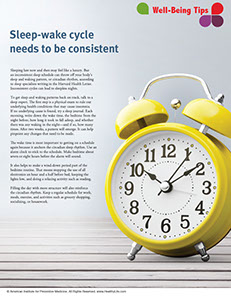SYMPTOM CHECKER
CONDITIONS
Male
Female
Child
Arm, Hand & Shoulder Concerns
Legs & Feet Concerns
Dental & Mouth Concerns
Ear & Nose
Eye Conditions
Head Conditions
Arm, Hand & Shoulder Concerns
Legs & Feet Concerns
Front
Back
Arm, Hand & Shoulder Concerns
Dental & Mouth Concerns
Ear & Nose
Eye Conditions
Head Conditions
Arm, Hand & Shoulder Concerns
Dental & Mouth Concerns
Ear & Nose
Eye Conditions
Head Conditions
Front
Back
Arm, Hand & Shoulder Concerns
Neck Links
Head & Neck Concerns
Arm, Hand & Shoulder Concerns
Neck Links
Head & Neck Concerns
Front
Back
Online Clinic
Wise Healthcare
Sleep-wake cycle needs to be consistent
Print on Demand
Sleeping late now and then may feel like a luxury. But an inconsistent sleep schedule can throw off your body’s sleep and waking pattern, or circadian rhythm, according to sleep specialists writing in the Harvard Health Letter. Inconsistent cycles can lead to sleepless nights.
To get sleep and waking patterns back on track, talk to a sleep expert. The first step is a physical exam to rule out underlying health conditions that may cause insomnia. If no underlying cause is found, try a sleep journal. Each morning, write down the wake time, the bedtime from the night before, how long it took to fall asleep, and whether there was any waking in the night—and if so, how many times. After two weeks, a pattern will emerge. It can help pinpoint any changes that need to be made.
The wake time is most important to getting on a schedule again because it anchors the circadian sleep rhythm. Use an alarm clock to stick to the schedule. Make bedtime about seven or eight hours before the alarm will sound.
It also helps to make a wind-down period part of the bedtime routine. That means stopping the use of all electronics an hour and a half before bed, keeping the lights low, and doing a relaxing activity such as reading.
Filling the day with more structure will also reinforce the circadian rhythm. Keep a regular schedule for work, meals, exercise, and activities such as grocery shopping, socializing, or housework.
This website is not meant to substitute for expert medical advice or treatment. Follow your doctor’s or health care provider’s advice if it differs from what is given in this guide.
The American Institute for Preventive Medicine (AIPM) is not responsible for the availability or content of external sites, nor does AIPM endorse them. Also, it is the responsibility of the user to examine the copyright and licensing restrictions of external pages and to secure all necessary permission.
The content on this website is proprietary. You may not modify, copy, reproduce, republish, upload, post, transmit, or distribute, in any manner, the material on the website without the written permission of AIPM.
2021 © American Institute for Preventive Medicine - All Rights Reserved. Disclaimer | www.HealthyLife.com

















































